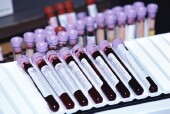
TUESDAY, Feb. 3, 2015 (HealthDay News) — Researchers have developed a blood test that they say could help neurologists detect Parkinson’s disease and track the illness as it progresses.
“If successful, we expect our findings will translate into a valuable diagnostic tool for Parkinson’s disease,” said study co-author Judith Potashkin, professor of cellular and molecular pharmacology at Chicago Medical School, Rosalind Franklin University of Medicine and Science.
An estimated 60,000 people in the United States are diagnosed with Parkinson’s disease each year, according to the Parkinson’s Disease Foundation. There is no cure for the disease, which can cause tremors and severely hamper movement. While medications can be helpful, the illness gets worse over time, and medications do not stop its progression.
Physicians traditionally diagnosed Parkinson’s by analyzing symptoms. Now, brain scans are available that provide insight, but scan images can still leave room for doubt, Potashkin said.
In their new study, researchers say they’ve found two genetic markers that are 90 percent effective at indicating the presence of Parkinson’s disease. The markers are related to how the body processes glucose (blood sugar) and insulin, said study lead author Jose Santiago, a research associate at Chicago Medical School.
The researchers then tracked 101 people with Parkinson’s and 91 healthy people. They found that gene “expression” changed significantly over three years in the Parkinson’s patients.
More research is needed to confirm that the test works, and the researchers would like to make it more accurate. Also, it’s not clear how much the test might ultimately cost.
One goal is to “greatly” improve the accuracy of Parkinson’s diagnosis through a combination of analysis of symptoms, brain scans and blood tests, Potashkin said. It would also help to diagnose Parkinson’s in early stages and use blood tests to check its progress and see if drugs work early on, she said.
A blood test to diagnose Parkinson’s would conceivably be “much less expensive and more easily accessible” than brain scans, said Julie Andersen, a professor at Buck Institute for Research on Aging in Novato, Calif.
Dr. Somshuvra Mukhopadhyay, an assistant professor of pharmaceutics at the University of Texas at Austin, called the new study “exciting.” However, he cautioned that “further work is necessary before this becomes a diagnostic and clinical standard.”
It’s not clear whether Parkinson’s causes changes in the genes or if the genes actually contribute to the development of Parkinson’s, the researchers said. Both genes are associated with diabetes, and scientists suspect there may be a link between the two diseases.
“There has been a suggestion from earlier clinical studies that diabetes may be a risk factor for subsequent Parkinson’s development,” Andersen said. “It is also possible that Parkinson’s and diabetes share similar underlying causes associated with aging.”
The study was published in the Feb. 3 online issue of the Proceedings of the National Academy of Sciences.
More information
For more about Parkinson’s disease, visit the U.S. National Institute of Neurological Disorders and Stroke.
Copyright © 2026 HealthDay. All rights reserved.

